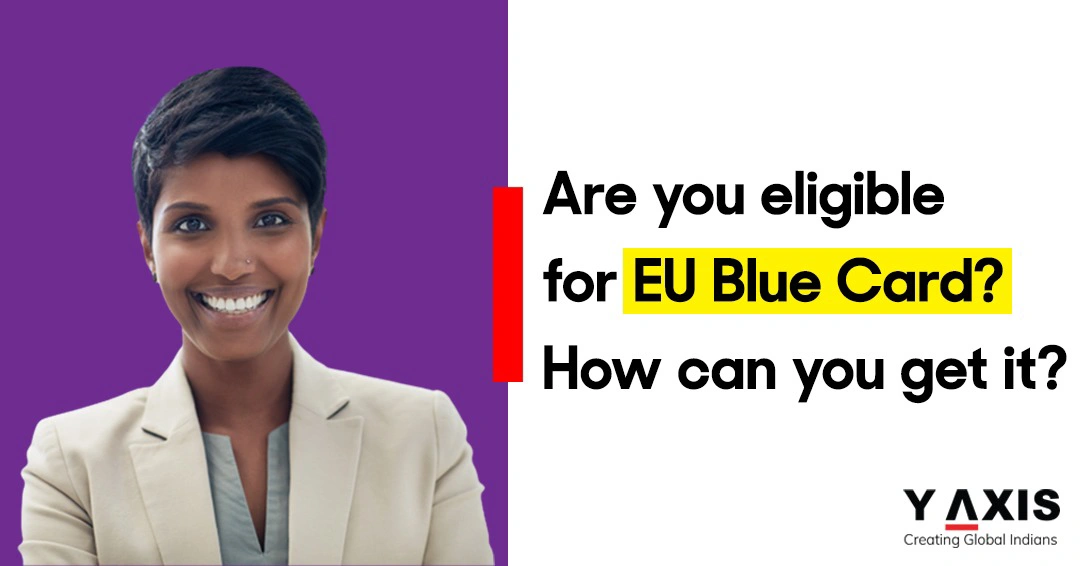Posted on February 28 2022
Are you Eligible for EU Blue Card? How can you get it?
By , Editor
Updated September 25 2023
Introduction
The EU blue card is given to the non-EU/EEA people. The card acts as a work and residence permit in the EU. These people can go for permanent residence, and then they can apply for EU citizenship. The Euroepean Blue card will help the immigrants to get socio-economic rights. Not all countries in the European Union or EU deliver EU Blue Cards. The countries that issue Blue Card are
- Austria
- Bulgaria
- Belgium
- Croatia
- Czech Republic
- Cyprus
- Estonia
- Germany
- France
- Finland
- Lithuania
- Greece
- Italy
- Malta
- Hungary
- Latvia
- Luxembourg
- Netherlands
- Romania
- Portugal
- Poland
- Slovakia
- Slovenia
- Spain
- Sweden
The countries that do not issue Blue Card are
- Denmark
- Ireland
- Norway
- Liechtenstein
- Iceland
- Switzerland
*Know how to get permanent residence in Germany, with the help of Y-Axis professionals.
What is EU Blue Card Program?
The EU Blue card works on a merit-based system. The merit of an applicant is based on his education. Work experience and skills. Point system is not included in the EU Blue Card program.
Benefits of EU Blue card
The EU Blue Card has the following benefits.
- Work and salary conditions will be the same as the citizens of the EU
- People can go to any place in the EU
- Family reunification benefit is also included
- People will get permanent residency rights, and they can also apply for permanent citizenship.
Eligibility criteria for EU Blue Card
The eligibility criteria include the following.
- Master’s degree or its equivalent
- Work experience of five years
- Occupation offer or work contract
- Proof of legal requirement for regulated professions
Requirements needed for Blue Card
Here are the requirements for a candidate to get an EU Blue Card.
- Form
- Valid passport for 15 more months
- Two photos
- Occupation offer with an employer in the EU. The offer has to be signed by all the parties who are involved in the selection and employment.
- A university diploma which will act as proof of professional along with work experience of 5 years is required.
- Curriculum Vitae should be updated.
- Health insurance proof
- Fee payment proof
- A letter from the employer for the reason of employment
- No threat proof
Application process
EU member states can decide whether a third country will make the card or the employer will go for the process. Member states ask the applicants to set their appointment at embassies in their home countries and apply for the card.
Application fee
The issuance fee for the card is 140 €, while renewal fee is 100 €.
Application process time
It takes around three months or 90 days to process the application.
Validity of Blue Card
The validity of a blue card is three years. Renewal of the card can be done if the duration of employment is extended. If the employment duration is less than three years, the candidate will get the blue card for the same amount of period plus three months.
The extension of three months is given so that the candidate can either go for extension of the current employment or seek a new job. In the case of losing the job, the candidate will get a three-month extension to look for a new job. If he is unable to get a job, he has to leave the country.
Conclusion
Blue card is a work and residence permit in any of the member states in the European Union. The candidates can apply for the card after they get an employment in any of the member states. They need to have a employment offer, employer’s letter, updated CV, and other proofs to apply for the card.
Want to move to the EU from Australia? Follow up with Y-Axis, a popular migration consultant agency in Australia.
If you like this article, you can also read...
Mistakes to avoid to save your Schengen Visa application from rejection
Tags:
Benefits of EU Blue card
EU Blue Card
Validity of Blue Card
Share

